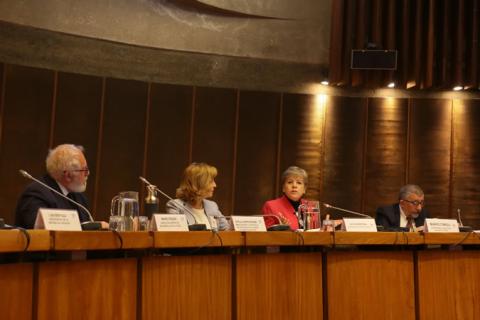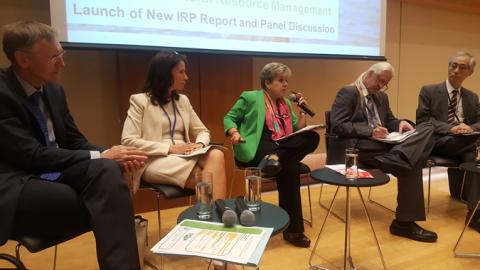Press Release
(January 23, 2015) The Executive Secretary of the Economic Commission for Latin America and the Caribbean (ECLAC), Alicia Bárcena, participated in the World Economic Forum Annual Meeting 2015 (WEF) held in Davos, Switzerland, where she moderated a high-level session on Latin America’s economic context and met with authorities and mining industry executives from around the world, among other activities.
Presiding the session on the Latin American context, Bárcena stressed that after several years of prosperity, the region’s countries are at a crossroads today with a decelerating economy—which grew just 1.1% on average in 2014, although a rebound to 2.2% is estimated for 2015—and stagnating regional exports.
“In this scenario, it is fundamental for the region to recuperate investment and advance towards a structural change to consolidate the social achievements made in recent years and to improve our economies’ integration in regional and global value chains,” the senior United Nations official said.
Other participants in that session were Mexico’s Economy Secretary, Ildefonso Guajardo; Brazil’s Strategic Affairs Minister, Marcelo Côrtes Neri; the Vice-Chairman of Argentina’s Banco Hipotecario, Mario Blejer; the Chief Executive Officer of Itaú Unibanco, Roberto Setubal; and international analyst and member of the Carnegie Endowment for International Peace, Moisés Naím.
The panelists analyzed the current situation in Latin America and discussed topics such as international trade, investment, fiscal and social reforms, social movements, poverty and inequality, innovation, security and corruption.
Previously, Alicia Bárcena was one of the main speakers at the WEF session called “Driving sustainable growth through shared infrastructure models in Mining & Metals,” in which authorities and senior business representatives participated, among them Gordon Brown, former Prime Minister of the United Kingdom and current Chair of the World Economic Forum Global Strategic Infrastructure Initiative; Mauricio Cárdenas, Colombia’s Minister of Finance and Public Credit; Daniel Muñiz Quintanilla, President of Grupo México SA de CV; and Andrónico Luksic, Executive Director of Antofagasta Minerals SA (Chile).
In her presentation, ECLAC’s Executive Secretary reiterated the critical role of investment—both public and private—and emphasized the need to advance towards compacts on the governance of natural resources in Latin America and the Caribbean.
“To connect natural resources with the development of new logistical infrastructure is a coherent path for advancing towards governance of these resources, while also addressing the persistent infrastructure gap and increasing the region’s competitiveness through the promotion of more sustainable regional development that has multiplier effects on the economy, social inclusion and equality,” Bárcena said.
On Friday, January 23, Alicia Bárcena participated in the release of a new report by the World Economic Forum entitled “Bridging the Skills and Innovation Gap to Boost Productivity in Latin America,” which offers new recommendations focused on narrowing the gaps in innovation and development in Latin America to increase the region’s competitiveness.
The report was prepared by the “Competitiveness Lab” initiative that the World Economic Forum launched in the region and in which ECLAC participated, along with other international organizations and representatives from the private sector and academia. The report emphasizes the need to strengthen skills and labor abilities through greater public and private investment, innovative public-private alliances, and increased intra-regional collaboration.
Finally, Alicia Bárcena joined the United Nations Secretary-General and Deputy Secretary-General, Ban Ki-moon and Jan Eliasson, respectively, at a WEF session called “Informal Gathering of World Economic Leaders: Defining the Imperatives for 2015” (IGWEL). Participants included other representatives of UN system organizations as well as chiefs of state, ministers and authorities from throughout the world, experts from international organizations, business leaders and renowned scholars.
During the meeting, those attending debated the challenges foreseen in 2015, especially regarding what kind of actions must be taken to accelerate economic growth through more jobs in different regions of the world, as well as what measures could enable progress on the fulfillment of the Sustainable Development Goals (SDGs), proposed by the international community to be adopted this year.
Alicia Bárcena highlighted the importance and historic opportunities associated with the adoption of the post-2015 development agenda and of the SDGs; the global summit on financing for development; and the goal of achieving a climate agreement at the Conference of the Parties of the United Nations Framework Convention on Climate Change (COP) in Paris. She reiterated that ECLAC will support the construction of regional perspectives in these three processes.
“These challenges require a renewed commitment and alliances between government actors, the private sector and civil society,” Bárcena emphasized.



